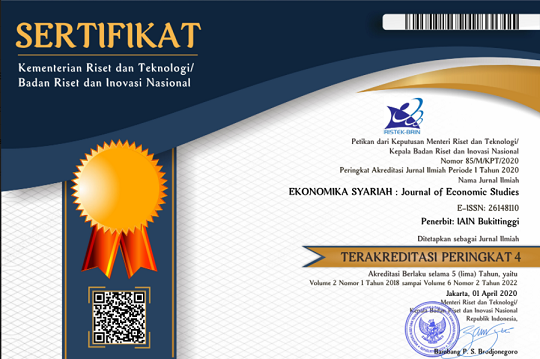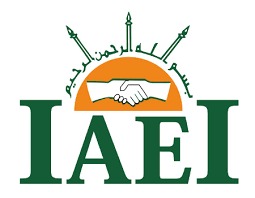Macroeconomic Effects on Economic Growth in Muslim Countries: Political System as A Moderating Variable
DOI:
https://doi.org/10.30983/es.v7i1.6358Keywords:
economic growth, foreign direct investment, interest rates, political system, remittancesAbstract
This study seeks to explore the role of the political system in supporting the influence of macro variables on economic growth in the world's Islamic countries. Data obtained from the world bank during 2010-2021. The econometric model used in the research is the Generalized Method of Moments (GMM). The main finding is that the political system has a significant negative effect on growth. This negative effect is caused by the low value of the political index determined by world governance indicators. In addition, foreign direct investment and remittances are still the main variables in supporting economic growth in the Islamic countries of the world. In contrast, interest rates show negative effects on economic growth. Further results show that an ineffective political system is unable to strengthen the relationship between foreign direct investment, remittances, and interest rates on economic growth. These findings serve as an evaluation for the 2025 OIC internal implementation action program.
Abstrak
Studi ini berusaha untuk mengeksplorasi peran dari sistem politik dalam mendukung pengaruh variabel makro terhadap pertumbuhan ekonomi di negara Islam dunia. Data diperoleh dari world bank selama tahun 2010-2021. Model ekonometrika yang digunakan dalam penelitian ialah generalized method of moments (GMM). Adapun temuan utamanya ialah sistem politik berpengaruh negatif signifikan terhadap pertumbuhan. Efek negatif ini disebabkan dengan rendahnya nilai indeks politik yang ditentukan oleh world governance indicators. Selain itu, investasi asing langsung dan remitansi masih menjadi variabel utama dalam mendukung pertumbuhan ekonomi di negara-negara Islam dunia. Sebaliknya, tingkat suku bunga menunjukkan efek negatif terhadap pertumbuhan ekonomi. Hasil selanjutnya ditunjukkan bahwa sistem politik yang tidak efektif tidak mampu memperkuat hubungan antara investasi asing langsung, remitansi, dan tingkat suku bunga terhadap pertumbuhan ekonomi. Temuan ini menjadi evaluasi untuk program aksi OKI 2025 yang saat ini masih berlangsung.References
Adegboye, F. B., Osabohien, R., Olokoyo, F. O., Matthew, O., & Adediran, O. (2020). Institutional quality, foreign direct investment, and economic development in sub-Saharan Africa. Humanities and Social Sciences Communications, 7(1), 1–9. https://doi.org/10.1057/s41599-020-0529-x
Adekunle, I., Williams, T., Omokanmi, O., & Onayemi, S. (2020). The mediating role of institutions in the remittance-growth relationship: Evidence from Nigeria. Economic Annals, 65(227), 7–30. https://doi.org/10.2298/eka2027007a
Al-Sadiq, A. (2021). The Role of E-Government in Promoting Foreign Direct Investment Inflows. IMF Working Papers, 16(141). https://doi.org/10.5089/9781513566795.001
Al Farooque, O., Hamid, A., & Sun, L. (2022). National Governance Index, Corruption Index, and Growth Rate—International Evidence from Sub-Saharan and MENA Countries. Journal of Risk and Financial Management, 15(6). https://doi.org/10.3390/jrfm15060261
Arditha Wahyu Waskita Raisaba, I. B. P. P. (2021). The Effect of Interest Rate and Rupiah Exchange Rate on Economic Growth and Indonesian Export Value. IJISET - International Journal of Innovative Science, Engineering & Technology, 8(5), 639–646.
Ayyub, R. (2000). Domestic Violence in the South Asian Muslim Immigrant Population in the United States. Journal of Social Distress and the Homeless, 9(3), 237–248. https://doi.org/10.1023/A:1009412119016
Baklouti, N., & Boujelbene, Y. (2020). An econometric study of the role of the political stability on the relationship between democracy and economic growth. Panoeconomicus, 67(2), 187–206. https://doi.org/10.2298/PAN170308015B
Barro, R. J. (1990). Economic Growth and Covergance Across the United States. Working Paper, August.
Bedane, B. G., Kitenge, E., & Alam, M. R. (2017). Volume 37 , Issue 1 This paper employs a System Generalized Method of Moments ( System GMM ) technique to examine the impact of. Economics Bulletin, January.
Bouchoucha, N., & Ali, W. (2019). The impact of FDI on economic growth in Tunisia: An estimate by the ARDL approach. Munich Personal RePEc Archive, 91465(91465), 1–23.
Briceño, H. R., & Perote, J. (2020). Determinants of the public debt in the Eurozone and its sustainability amid the Covid-19 pandemic. Sustainability (Switzerland), 12(16). https://doi.org/10.3390/su12166456
Cazachevici, A., Havranek, T., & Horvath, R. (2020). Remittances and economic growth: A meta-analysis. World Development, 134, 105021. https://doi.org/10.1016/j.worlddev.2020.105021
Clark, G. (1996). Massachusetts Institute of Technology and the editors of The Journal of Interdisciplinary History and Weingast argue that the political history of England in the Revolution illustrates two important of secure and stable cite England during the seventeenth. The Journal of Interdisciplinary History, 26(4), 563–588.
Crowley, J. (2007). Interest Rate Spreads in English-Speaking African Countries. IMF Working Papers, 07(101), 1. https://doi.org/10.5089/9781451866650.001
Drobyshevsky, S. (2017). The Effect of Interest Rates on Economic Growth Elena Sinelnikova-Muryleva The Effect of Interest Rates on Economic Growth. Paper: Ideas.Repec.Org.
Eggoh, J., Bangake, C., & Semedo, G. (2019). Do remittances spur economic growth? Evidence from developing countries. Journal of International Trade and Economic Development, 28(4), 391–418. https://doi.org/10.1080/09638199.2019.1568522
Ehikioya, B. I., & Omankhanlen, A. E. (2021). Impact of public debt on economic growth: Evidence from Nigeria. Montenegrin Journal of Economics, 17(1), 97–109. https://doi.org/10.14254/1800-5845/2021.17-1.7
Evsey D. Domar. (1947). Expansion and Employment. The American Economic Review, 37(1), 34–55. https://doi.org/10.1057/9780230226203.0037
Gao, C., Wen, Y., & Yang, D. (2022). Governance, financial development and China’s outward foreign direct investment. PLoS ONE, 17(6 June), 1–22. https://doi.org/10.1371/journal.pone.0270581
Giuliano, P., & Ruiz-Arranz, M. (2009). Remittances, financial development, and growth. Journal of Development Economics, 90(1), 144–152. https://doi.org/10.1016/j.jdeveco.2008.10.005
Hajer Kratou & Kauthar Gazdar. (2020). Addressing the effect of workers’ remittance on economic growth: Evidence from MENA countries. International Journal of Social Economics, 34(1), 1–5.
Hamdaoui, M., Ayouni, S. E., & Maktouf, S. (2022). Capital Account Liberalization, Political Stability, and Economic Growth. Journal of the Knowledge Economy, 13(1), 723–772. https://doi.org/10.1007/s13132-021-00723-y
Harrod. (1939). An Essay in Dynamic Theory. Blackwell Publishing for the Royal Economic Society, 49, 14–33.
Harvey, C. R. (1988). The real term structure and consumption growth. Journal of Financial Economics, 22(2), 305–333. https://doi.org/https://doi.org/10.1016/0304-405X(88)90073-6
Hoque, M. E., Akhter, T., & Yakob, N. A. (2018). Revisiting endogeneity among foreign direct investment, economic growth and stock market development: Moderating role of political instability. Cogent Economics and Finance, 6(1), 1–21. https://doi.org/10.1080/23322039.2018.1492311
Ihsan, A. (2021). Determinants of Economic Growth in Organization of Islamic Cooperation with Governance Index as a Moderating Variable. Journal of Economics, Finance And Management Studies, 04(08), 1394–1405. https://doi.org/10.47191/jefms/v4-i8-16
Isaac, K., Simplice, A., & Paper, E. W. (2021). ICT Diffusion , Foreign Direct Investment and Inclusive Growth in Sub-Saharan Africa E uropean X tramile C entre of A frican S tudies. In European Xtramile Centre of African Studies (Issue 21).
Isiaka, A., Isiaka, A., Isiaka, A., & Adenubi, O. (2021). What is the impact of financial depth on economic growth within middle income countries? International Journal of Research in Business and Social Science (2147- 4478), 10(1), 122–130. https://doi.org/10.20525/ijrbs.v10i1.1007
Johnson, A. (2006). The Effects of FDI Inflows on Host Country Economic Growth. The Royal Institute of Technology. Centre of Excellence for Studies in Science and Innovation Http://Www. Infra. Kth. Se/Cesis/Research/Publications/Working Papers, 58, 1–57.
Kharisma, B., Wardhana, A., & Sofyan, M. N. F. (2022). Do Institutions Cause Growth? Evidence from Asian Countries. Jurnal Ekonomi & Studi Pembangunan, 23(1), 51–65. https://doi.org/10.18196/jesp.v23i1.13897
Khushnood, E., Channa, Z. H., Bhutto, M., & Ali Erri, M. (2020). Impact of Good Governance Indicators on the Inflow of Foreign Direct Investment (FDI) In Pakistan. NICE Research Journal, 13(2), 69–83. https://doi.org/10.51239/nrjss.v0i0.175
Kratou, H., & Gazdar, K. (2015). Addressing the effect of workers’ remittance on economic growth: evidence from MENA countries. International Journal of Social Economics, 43(1), 51–70. https://doi.org/10.1108/IJSE-08-2013-0189
Kumar, R. R., Stauvermann, P. J., Patel, A., & Prasad, S. (2018). The Effect of Remittances on Economic Growth in Kyrgyzstan and Macedonia: Accounting for Financial Development. International Migration, 56(1), 95–126. https://doi.org/10.1111/imig.12372
Kurul, Z., & Yasemin Yalta, A. (2017). Relationship between institutional factors and FDI flows in developing countries: New evidence from dynamic panel estimation. Economies, 5(2). https://doi.org/10.3390/economies5020017
Maksym Ivanyna & Andrea Salerno. (2021). Governance for Inclusive Growth (p. 44). IMF Working Papers. https://doi.org/https://doi.org/10.5089/9781513582467.001
Matsumoto, H. (2022). Foreign reserve accumulation, foreign direct investment, and economic growth. Review of Economic Dynamics, 43(2017), 241–262. https://doi.org/10.1016/j.red.2021.02.002
Maune, A., & Matanda, E. (2022). Public Sector Governance and Capital Investment Financing : Evidence from Zimbabwe. Journal of Accounting and Management, 12(3), 163–175.
Mauro, P. (1995). CORRUPTION AND GROWTH * I . INTRODUCTION Many economists argue that malfunctioning government insti- tutions constitute a severe obstacle to investment , entrepreneur- ship , and innovation . North [ 1990 ] emphasizes the importance of determinant of econ. The Quarterly Journal of Economics, 110(3), 681–712.
Meyer, D., & Shera, A. (2017). The impact of remittances on economic growth: An econometric model. EconomiA, 18(2), 147–155. https://doi.org/10.1016/j.econ.2016.06.001
Meyer, K. E., & Nguyen, H. V. (2005). Foreign investment strategies and sub-national institutions in emerging markets: Evidence from Vietnam. Journal of Management Studies, 42(1), 63–93. https://doi.org/10.1111/j.1467-6486.2005.00489.x
Nawaz, A. R., Anwar, U., & Aquil, F. (2021). An Economic Impact of Political Instability: An Evidence from Pakistan. Journal of Economic Impact, 3(1), 47–54. https://doi.org/10.52223/jei3012106
Obansa, S. A. J., Okoroafor, O. K. D., Aluko, O. O., & Eze, M. (2013). Percieved Relationship between Exchange Rate, Interest Rate and Economic Growth in Nigeria: 1970-2010. American Journal of Humanities and Social Sciences, 1(3). https://doi.org/10.11634/232907811301374
Ogbuabor, J. E., Orji, A., Manasseh, C. O., & Anthony-Orji, O. I. (2020). Institutional Quality and Growth in West Africa: What Happened after the Great Recession? International Advances in Economic Research, 26(4), 343–361. https://doi.org/10.1007/s11294-020-09805-0
Okwu, A. T., Oseni, I. O., & Obiakor, R. T. (2020). Does Foreign Direct Investment Enhance Economic Growth? Evidence from 30 Leading Global Economies. Global Journal of Emerging Market Economies, 12(2), 217–230. https://doi.org/10.1177/0974910120919042
Orogwu, D., Fakoyode, S., Itopa, M., & Abdulbasit, A. (2021). Sectoral analysis of foreign direct investment and growth in Nigeria. Applied Journal of Economics, Management and Social Sciences, 2(1), 33–41. https://doi.org/10.53790/ajmss.v2i1.4
Oyegoke, E. O., & Aras, O. N. (2021). Impact of Foreign Direct Investment on Economic Growth in Nigeria. Journal of Management, Economics, and Industrial Organization, 108348, 31–38. https://doi.org/10.31039/jomeino.2021.5.1.2
Paksi, R. P. (2021). Determinants of Economic Growth: Case of Indonesia. Jurnal Dinamika Ekonomi Pembangunan, 3(3), 157–171. https://doi.org/10.14710/jdep.3.3.157-171
Privarova, M. (2020). Emigration, Remittances and Economic Growth in the Baltic States: a Regional Perspective. The EUrASEANs: Journal on Global Socio-Economic Dynamics, 6(6(25)), 36–48. https://doi.org/10.35678/2539-5645.6(25).2020.36-48
Rostow. (1959a). The Economic History Review. Routledge Library Editions: Historiography, 1–16. https://doi.org/https://doi.org/10.1111/ehr.1959.12.issue-1
Rostow. (1959b). The Stages of Economic Growth. The Economic History Review, 1–16. https://doi.org/10.1111/ehr.1959.12.issue-1
Roux, L., Moyo, C., & Pierre. (2018). Interest rate reforms and economic growth: the savings and investment channel Interest rate reforms and economic growth: the savings and investment channel. Munich Personal RePEc Archive, 85297.
Saad, W., & Ayoub, H. (2019). Remittances, Governance and Economic Growth: Empirical Evidence from MENA Region. International Journal of Economics and Finance, 11(8), 1. https://doi.org/10.5539/ijef.v11n8p1
Sheikh, N. S. (2002). The New Politics of Islam : Pan-Islamic Foreign Policy in a World of States. In American Journal of Islamic Social Sciences.
Shield. (2017). Mongolia - Foreign Investment Opinion. Framework, Privacy Shield.
Shirazi, N. S., Javed, S. A., & Ashraf, D. (2018). Remittances, economic growth and poverty: A case of african OIC member countries. Pakistan Development Review, 57(2), 121–143. https://doi.org/10.30541/v57i2pp.121-143
Suhendra, I., Istikomah, N., & Anwar, C. J. (2022). On Foreign Direct Investment from the ASEAN-8 Countries: A Panel Data Estimation. WSEAS Transactions on Business and Economics, 19(January 2020), 150–160. https://doi.org/10.37394/23207.2022.19.16
Sutradhar, S. R. (2020). The impact of remittances on economic growth in Bangladesh, India, Pakistan and Sri Lanka. International Journal of Economic Policy Studies, 14(1), 275–295. https://doi.org/10.1007/s42495-020-00034-1
Syarifuddin, F. (2015). Konsep, Dinamika, dan Respon Kebijakan Nilai Tukar di Indonesia. Bank Indonesia, 24, 1–101.
Uddin, M. A., Ali, M. H., & Masih, M. (2020). Institutions, human capital and economic growth in developing countries. Studies in Economics and Finance, 38(2), 361–383. https://doi.org/10.1108/SEF-10-2019-0407
Ur Rehman, N., & Hysa, E. (2021). The effect of financial development and remittances on economic growth. Cogent Economics and Finance, 9(1). https://doi.org/10.1080/23322039.2021.1932060
Wilson, R. (2016). Does Governance Cause Growth? Evidence from China. World Development, 79, 138–151. https://doi.org/10.1016/j.worlddev.2015.11.015
Wusqo, U., & Ihsan, A. (2022). Determining Factors of Consumption in Islamic Countries in The World with Political Stability as a Moderating Variable. Jurnal Ilmiah Ekonomi Islam, 8(03), 2582–2592.
Yeager, T. J. (1999). Institutions, Transition Economies, and Economic Development. The Political Economy of Global Interdependency. Westview Press. Oxford.
Ziberi, B., & Alili, M. Z. (2021). Economic Growth in the Western Balkans: A Panel Analysis. South East European Journal of Economics and Business, 16(2), 68–81. https://doi.org/10.2478/jeb-2021-0015
Zidi, A., & Ben Ali, T. (2016). Foreign Direct Investment (FDI) and Governance: The Case of MENA. Journal of Research in Business, Economics and Management, 5(3), 598–608.
Downloads
Submitted
Accepted
Published
Issue
Section
License
Authors who publish with this journal agree to the following terms:
- Authors retain copyright and grant the journal right of first publication with the work simultaneously licensed under a Creative Commons Attribution-ShareAlike 4.0 International License that allows others to share the work with an acknowledgment of the work's authorship and initial publication in this journal.
- Authors are able to enter into separate, additional contractual arrangements for the non-exclusive distribution of the journal's published version of the work (e.g., post it to an institutional repository or publish it in a book), with an acknowledgment of its initial publication in this journal.
- Authors are permitted and encouraged to post their work online (e.g., in institutional repositories or on their website) prior to and during the submission process, as it can lead to productive exchanges, as well as earlier and greater citation of published work (See The Effect of Open Access).












